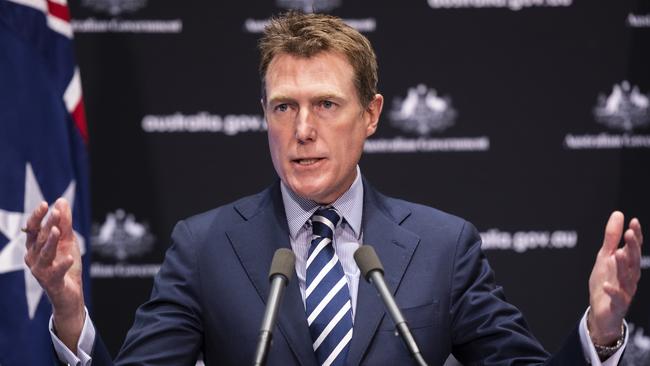Coronavirus: Christian Porter flags workplace reforms as early as October
Changes to IR policy could be implemented as early as October as the Attorney-General kicks off talks with unions and employers.

Changes to industrial relations policy could be implemented as early as October as the Attorney-General, Christian Porter, kicks off talks with unions and employers to try to reach consensus over proposals designed to improve the workplace relations system.
Mr Porter will meet with the ACTU leadership and industry group representatives in Sydney on Wednesday to map out the process for his proposed consultations with five so-called “reform committees” in the next four months.
Each of the committees will focus on one area of workplace relations policy: award simplification; enterprise agreements; casual and fixed-term employees; compliance and enforcement; and greenfields agreements for new enterprises.
Proposals to be examined by the compliance and greenfields groups are well advanced, with the government having already drafted a bill criminalising serious forms of wage theft.
On greenfields agreements, the government has expressed support for new deals that lock in pay rates and prevent legal industrial action for the life of projects.
On casuals, Mr Porter is looking at increasing their ability to convert to permanent employment as an olive branch to unions, as he seeks to establish a new definition of casual employment and protect companies from significant backpay claims following Federal Court rulings.
The Australian has revealed that unions and employers will be required to submit proposed industrial relations changes for scrutiny by senior Treasury officials, who will “stress test” them for productivity benefits, costs to the economy and job creation.
Employer suggestions that companies face up to $8bn in backpay demands following the court judgments and union claims about casual employment will be among the issues to be examined by Treasury and Finance officials.
ACTU secretary Sally McManus and ACTU president Michele O’Neil will lead the union delegation, while employers will be represented by the Australian Chamber of Commerce and Industry, the Australian Industry Group, the Business Council of Australia, the Australian Resources and Energy Group, the Chamber of Minerals and Energy, and Master Builders Australia.
Mr Porter said the process was directed at committee members being potentially able to reach a consensus around policy proposals that the government could then put into action, by way of legislation, regulation, or via the budgetary process in October.
“The problems within each of the five areas we have chosen to focus on are well known and I am confident that if we can work cooperatively, an opportunity exists to make meaningful progress in developing solutions that will make a significant difference to how quickly we can recover from this crisis,” Mr Porter said.
The committees will each have a maximum of 15 members.
“While participants will no doubt want to raise other issues outside of the five areas, all participants will be encouraged to leave the traditional wish lists at the door and focus on getting results that can be achieved in the shortest possible timeframe,” he said.




To join the conversation, please log in. Don't have an account? Register
Join the conversation, you are commenting as Logout